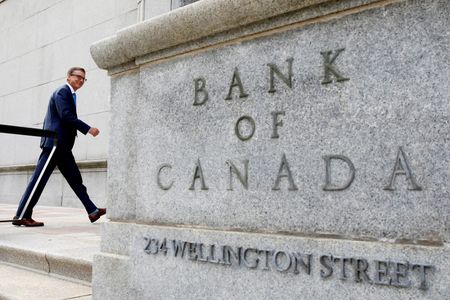 1
1 1
1

By Indradip Ghosh
BENGALURU (Reuters) – The Bank of Canada will hike its key interest rate by another 50 basis points to 4.25% on Dec. 7, according to a slim majority of economists in a Reuters poll that suggests the central bank will then hit pause on a nine-month tightening campaign.
An economy that grew at a solid annualized 2.9% rate in the third quarter is increasingly at risk from a falling property market and one of the highest household debt-to-income ratios in the world, with the full effect of rate rises yet to be felt.
Inflation, at 6.9% in October, is still running over three times the central bank’s 2% target.
That has left economists and markets at odds over whether the BoC, which has raised rates by 350 basis points since March, will opt for another half-point move and aim to wind up an aggressive campaign before an expected recession sets in.
Just over half, 16 of 30, of the economists polled over the last few days expected a half-point rise on Dec. 7 to 4.25%, matching a move in October and in line with current expectations for the U.S. Federal Reserve’s December meeting.
Fourteen said the BoC would dial down its pace to 25 basis points. Markets are pricing in an over 80% chance of 25, which would be a third straight reduction in rate hike size by policymakers from a peak of 100 in July.
“The rise in inventory ratios and weakness in domestic demand should be a signpost of weaker domestically-driven inflationary pressures in the future,” said Andrew Grantham, senior economist at CIBC.
“As such, we continue to expect a final 50bp rate hike to a peak of 4.25%, before the Bank moves to the sidelines in 2023 to observe how the economy is coping with these higher interest rates.”
Of the large Canadian banks, Scotiabank, CIBC and National Bank expected a 50 basis point move with no further hikes afterward. RBC forecasts a 25 basis point hike and then a pause, while BMO expects 50 and then another 25 in early 2023.
Meanwhile personal spending and investment in housing declined last quarter, while a separate Reuters survey showed house prices would tumble a median 17.5% from their peak, roughly double the fall during the 2008-09 financial crisis.
Although there was no clear consensus on when the overnight rate would peak, around 90% of respondents, or 26 of 29, predicted a terminal rate of 4.25% or higher, suggesting the BoC may be done in December and if not, soon afterward.
The Fed, by contrast, is expected to raise its federal funds rate to a minimum of 4.75%-5.00% early next year, with the risks around forecasts skewed toward a higher rate.
With inflation expected to stay above the BoC’s target for the coming year, 10 of 13 economists who answered an additional question said the bigger risk was also that rates reach a higher peak, and later than they currently expect.
BoC Governor Tiff Macklem made clear at the October meeting the end of the rate hiking campaign was near.
“We are getting closer, but we are not there yet,” he told reporters at a news conference.
BoC Senior Deputy Governor Carolyn Rogers recently said higher interest rates were starting to slow the economy and high household mortgage debt had remained a major area of concern.
Seven of 12 respondents to an additional question said the BoC’s level of concern was about right.
“The latest BoC research on household vulnerability and flexible mortgage rates support the idea that the BoC terminal rate will end at least 50 basis points below the U.S. Federal Reserve,” said Sebastien Lavoie, economist at Laurentian Bank.
(For other stories from the Reuters global economic poll)
(Reporting by Indradip Ghosh; Polling by Mumal Rathore; Editing by Ross Finley and Chizu Nomiyama)